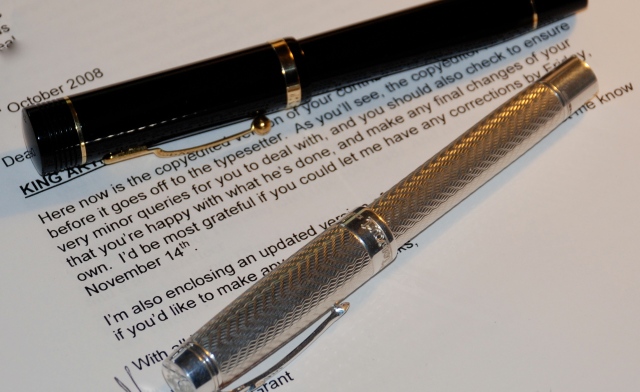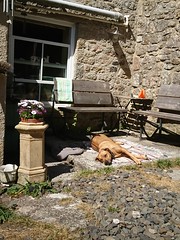Editors are Good!

I am just getting the editor’s comments back on my latest manuscript.
Hmm.
I value editors – the work they do is absolutely essential. They can radically improve a piece of work with what can seem like tiny changes. Still, those tiny alterations can be incredibly difficult to get across to the author sometimes.
The thing is, the author can be utterly stuck in the way they work. An author creates a whole world, an environment, a political situation, and populate it with people who are, as the author writes, real people in his or her mind. The book evolves from an initial concept, a sketched plan, a map of events, or perhaps just a chance conversation overheard in a bus or on a train.
As the writer develops the ideas in the book, the characters grow and develop. The plot will change, because since the characters have grown while being written, their motivations will also be impacted. And suddenly the crucial turn of events that led to the crisis on page 230, wouldn’t have happened. Because Big Josh actually wasn’t stupid enough to have thrown over Alice and Mack the Mauler wouldn’t have got jealous and … or whatever.
The fact is, the writer will write the story, sometimes at speed, and then, to accommodate the original plan, will change characters to fit the scheme. Or ignore the fact that the character’s motivations are all wrong.
It’s not the author’s fault. When a writer rereads words on a page, they have an especial significance. They see not just the words, but the mental images that led to those words. They see people in their mind, they hear conversations, or see events unroll like film reels in their minds. And then the words on the page embellish those scenes.
Sadly, of course, a reader hasn’t got all that background. The reader sees only what is on the page. Sometimes a writer can put the facts down in a way that stimulates the reader into imagining a whole new world. Often the writer alone cannot. That is where the editor comes in.
The editor can usually understand the story better than the average reader. They have been involved in the development of the story from the outset, and will have a half-formed view of what the author’s working towards. So the arrival of the manuscript is a stage on the route for the editor.
So they edit.
Once I was able to change the entire direction of a book by the addition of one short sentence. At the editor’s suggestion. I have seen confused descriptions and sloppy characterisation transformed by a good editor.
However, there is a tough point to accept here.
If you are the writer, you have to accept that the work is collaborative. No one has a monopoly of genius. If the editor reads a work and decides that major changes have to be made, it is best to grit the teeth and knuckle down.
Because that is where the editor does know best. Not because of some spurious knowledge of the arcane arts of marketing. No. Purely because editors generally love books and words, and they can see when the story needs to be redirected, gently, rather than going off the rails.
So authors need to be brave when editors’ comments are posted. Yes, the work is the writer’s own and, yes, they must show integrity when it comes to their work. Hacking at a manuscript for the sake of it is not what I mean. But there’s no point in getting defensive about editors who are only doing their job.
In short, as you can tell, I’m on tenterhooks wondering what delights the editor’s comments will hold in store for me.
I hope she’ll be kind …



I’m sure she will Michael.
Since I constantly edit as I write, I have been told by a few fellow writers that if I continue in the same way, I might develop a split personality. I assure you (and them) that nothing could be further from the truth. But, I have become noticeably self critical of my work as a result of adopting the technique. This is a good thing. ;)
LikeLike
I agree. I tend to review yesterday’s work in the morning and crack on with the next scenes when that’s done. Much faster and more efficient that way!
LikeLike
It is not a comfortable wait for editors’ comments, especially when we writers have bled so much for our work alreasy at this juncture. Then, we tentatively scour the returned manuscript. It is often a feat of great self-will not to shake the editor’s report senseless. Eventually we realise they were right and that tweak in the story arc will drastically improve your novel. More blood, sweat and tears ensue and you’re almost there. It’s challenging, frightening, gruelling, exciting and educational. I absolutely love it! Good luck on the WIP. I’m sure she will be (cruel to be) kind.
LikeLike
I do so agree. Luckily most editors are really kind … I did say “most” …
LikeLike
And saints preserve us, where would we be without said editors to spot those glaring typos? (already, not alreasy)! ;-)
LikeLike
Probably in my case, back working for a monthly salary!
LikeLike
On the flip-side, I have the editor’s fear of the author’s reaction to my edits! Elaine, your comment on “tentatively scouring the returned manuscript” rang so very true for me. I put this down to my relative newbie editor status, but I always have butterflies when it comes to reading my authors’ remarks about my well-intentioned suggestions. There is nothing more satisfying than just a simple “Good” hovering in a comment box above a mangled track-changes paragraph.
LikeLike
It’s so hard for both parties, I reckon. There’s never an easy way to explain where a passage just doesn’t work. Just as there’s never an easy way to ignore a critical commentary on work you thought was pretty damn good!
LikeLike